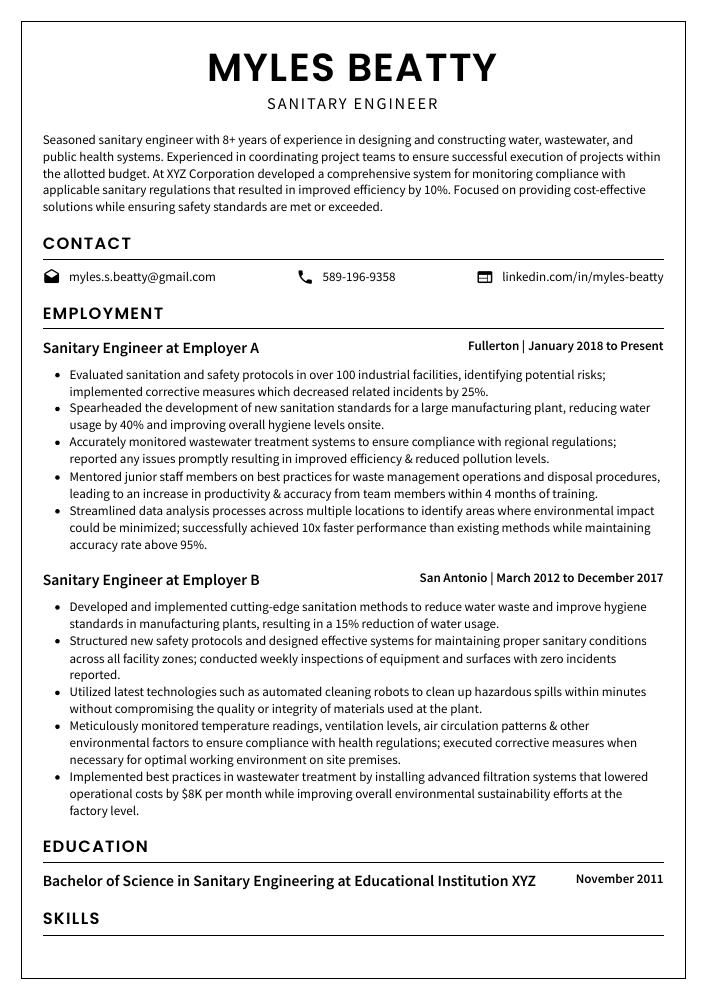Sanitary Engineer Resume Guide
Sanitary Engineers are responsible for designing, constructing and maintaining systems to protect the public from water-borne diseases. They plan and design sewage treatment plants, water supply networks and stormwater management systems. They also develop policies related to sanitation standards, monitor wastewater operations and ensure compliance with health regulations.
With your expertise in sanitary engineering, you could take any firm’s sanitation standards to the next level. But before they can consider hiring you, employers need to know who you are and what makes you stand out from other candidates. To do this, create a resume that captures their attention and highlights all of your qualifications.
This guide will walk you through the entire process of creating a top-notch resume. We first show you a complete example and then break down what each resume section should look like.
Table of Contents
The guide is divided into sections for your convenience. You can read it from beginning to end or use the table of contents below to jump to a specific part.
Sanitary Engineer Resume Sample
Myles Beatty
Sanitary Engineer
[email protected]
589-196-9358
linkedin.com/in/myles-beatty
Summary
Seasoned sanitary engineer with 8+ years of experience in designing and constructing water, wastewater, and public health systems. Experienced in coordinating project teams to ensure successful execution of projects within the allotted budget. At XYZ Corporation developed a comprehensive system for monitoring compliance with applicable sanitary regulations that resulted in improved efficiency by 10%. Focused on providing cost-effective solutions while ensuring safety standards are met or exceeded.
Experience
Sanitary Engineer, Employer A
Fullerton, Jan 2018 – Present
- Evaluated sanitation and safety protocols in over 100 industrial facilities, identifying potential risks; implemented corrective measures which decreased related incidents by 25%.
- Spearheaded the development of new sanitation standards for a large manufacturing plant, reducing water usage by 40% and improving overall hygiene levels onsite.
- Accurately monitored wastewater treatment systems to ensure compliance with regional regulations; reported any issues promptly resulting in improved efficiency & reduced pollution levels.
- Mentored junior staff members on best practices for waste management operations and disposal procedures, leading to an increase in productivity & accuracy from team members within 4 months of training.
- Streamlined data analysis processes across multiple locations to identify areas where environmental impact could be minimized; successfully achieved 10x faster performance than existing methods while maintaining accuracy rate above 95%.
Sanitary Engineer, Employer B
San Antonio, Mar 2012 – Dec 2017
- Developed and implemented cutting-edge sanitation methods to reduce water waste and improve hygiene standards in manufacturing plants, resulting in a 15% reduction of water usage.
- Structured new safety protocols and designed effective systems for maintaining proper sanitary conditions across all facility zones; conducted weekly inspections of equipment and surfaces with zero incidents reported.
- Utilized latest technologies such as automated cleaning robots to clean up hazardous spills within minutes without compromising the quality or integrity of materials used at the plant.
- Meticulously monitored temperature readings, ventilation levels, air circulation patterns & other environmental factors to ensure compliance with health regulations; executed corrective measures when necessary for optimal working environment on site premises.
- Implemented best practices in wastewater treatment by installing advanced filtration systems that lowered operational costs by $8K per month while improving overall environmental sustainability efforts at the factory level.
Skills
- Plumbing Systems
- Sewer Systems
- Water Treatment
- Environmental Regulations
- Hazardous Waste Management
- Stormwater Management
- Wastewater Treatment
- Solid Waste Management
- Sanitary Engineering Design
Education
Bachelor of Science in Sanitary Engineering
Educational Institution XYZ
Nov 2011
Certifications
Certified Sanitary Engineer
American Academy of Sanitary Engineering
May 2017
1. Summary / Objective
A resume summary/objective for a sanitary engineer should demonstrate your expertise in the field and highlight why you are an ideal candidate for the role. For example, you could mention how many years of experience you have designing sanitation systems, any certifications or qualifications that make you stand out from other applicants, and what kind of impact your work has had on public health initiatives.
Below are some resume summary examples:
Passionate sanitary engineer with 8+ years of experience developing and managing water supply, waste disposal, and sanitation systems. Seeking to join ABC Corporation as the lead sanitary engineer where I can share my knowledge in order to improve existing infrastructure while creating new sustainable solutions. In previous roles, reduced operating costs by 40% through process optimization initiatives while maintaining environmental safety standards.
Committed, detail-oriented sanitary engineer with over 9 years of experience in designing and implementing wastewater treatment systems. Experienced in all stages of the project cycle, from initial planning to completion. At XYZ Inc., successfully designed a complex water recycling system that saved 20% on operating costs while meeting EPA standards for quality output. Proven track record of effective management and reliable performance.
Dependable sanitary engineer with 5+ years of experience in the design, construction and maintenance of water systems. Experienced in conducting research to identify problems related to public health and safety. At XYZ Corporation, designed a cutting-edge sanitation system that reduced costs by 20%. Expertise spans from wastewater treatment processes, engineering fundamentals & principles to laboratory analysis techniques.
Energetic sanitary engineer with 10+ years of experience in developing and implementing water supply, waste disposal systems, and other related projects. At XYZ Corporation, successfully managed the development of a sanitation system for a new housing complex that increased efficiency by 20%. Possesses excellent organizational skills to manage multiple tasks simultaneously while achieving set objectives within deadlines.
Detail-oriented sanitary engineer with an expertise in designing and constructing sanitary systems. 8+ years of experience developing efficient plumbing solutions to ensure public health standards are met. Seeking to join ABC company where my engineering know-how can be used to improve the quality of sanitation services for their clients. Successfully implemented a wastewater treatment system that lowered costs by 23%.
Well-rounded sanitary engineer with 5+ years of experience in the water treatment and wastewater management industry. Seeking to join ABC’s engineering team, where I can employ my expertise in designing sustainable systems that ensure public health and safety regulations are met. At XYZ Inc., identified a process bottleneck which enabled a 15% reduction in operational costs while maintaining high-quality standards.
Talented sanitary engineer with 5+ years of experience designing and monitoring water, air, and soil systems for optimal public health. Highly experienced in formulating new solutions to complex problems related to the environment within a variety of settings. Seeking to join ABC Corp as a sanitary engineer where my knowledge can be used to protect local ecosystems and communities from environmental contamination.
Amicable and detail-oriented sanitary engineer with 5+ years of experience in the environmental engineering field. Seeking to leverage comprehensive knowledge and expertise for ABC’s water sanitation projects as a part of their team. At XYZ, successfully implemented an innovative wastewater treatment process that reduced pollutants by 45%.
2. Experience / Employment
In the experience section, you should provide details on your employment history. This section should be written in reverse chronological order, meaning that the most recent job is listed first.
When writing this section out, stick to bullet points; doing so makes it easier for the reader to digest what you have said quickly and efficiently. When describing your duties and accomplishments, make sure they are detailed and include any quantifiable results obtained from them.
For example, instead of saying “Developed waste management plans,” you could say: “Created a comprehensive plan for managing solid waste disposal which resulted in a 20% reduction of landfill usage over 6 months.”
To write effective bullet points, begin with a strong verb or adverb. Industry specific verbs to use are:
- Designed
- Installed
- Monitored
- Inspected
- Evaluated
- Operated
- Constructed
- Researched
- Analyzed
- Improved
- Implemented
- Upgraded
- Troubleshot
- Documented
Other general verbs you can use are:
- Achieved
- Advised
- Assessed
- Compiled
- Coordinated
- Demonstrated
- Developed
- Expedited
- Facilitated
- Formulated
- Introduced
- Mentored
- Optimized
- Participated
- Prepared
- Presented
- Reduced
- Reorganized
- Represented
- Revised
- Spearheaded
- Streamlined
- Structured
- Utilized
Below are some example bullet points:
- Expedited the completion of 18+ sanitary engineering projects, resulting in a 20% faster turnaround time.
- Revised the existing sanitation and safety protocols to ensure that all waste management processes were conducted efficiently; lowered overhead costs by $1,500 monthly.
- Successfully implemented an automated sewer system for two industrial complexes with no disruption to operations or loss of human capital; increased efficiency rate by 30%.
- Monitored water supplies across 10 locations using modern technology and identified potential health hazards before they became serious problems; prevented contamination incidents from occurring on 4 separate occasions due to prompt action taken based on monitoring results.
- Designed innovative wastewater treatment systems that reduced the amount of raw sewage discharged into rivers by 40%, thereby improving environmental sustainability efforts significantly within the region.
- Represented the engineering team in various regional safety committees and successfully improved the overall sanitation conditions of 3 manufacturing plants by 75%.
- Reorganized existing sanitary systems to ensure efficient water distribution, resulting in a 25% reduction in energy consumption for the facilities.
- Coordinated with local government officials to obtain necessary permits and approvals for waste management projects; completed 4 such initiatives on budget within deadline.
- Actively monitored wastewater treatment processes at production sites, ensuring compliance with relevant regulations; identified potential issues early and suggested solutions that minimized cost overruns by 20%.
- Assessed current hygiene protocols across all departments, recommending new standards which led to an increase of 50% productivity among workers due to a healthier work environment.
- Formulated comprehensive sanitation protocols to reduce workplace hazards and bacteria levels by over 40%, reducing employee absenteeism due to health-related issues.
- Advised local businesses on best practices for improving sanitation standards and increasing adherence to safety regulations; helped 25+ companies save $10,000 in fines within the last year.
- Upgraded existing water treatment facilities with modern technologies such as UV disinfection systems, significantly lowering total suspended solids (TSS) levels and other contaminants by 45%.
- Substantially improved sewage disposal operations through installation of automated pumping stations; reduced waste removal costs by 20% while doubling wastewater processing efficiency across 5 counties in the region.
- Analyzed data from environmental surveys to identify areas where further sanitary enhancements were required or needed; identified critical deficiencies at 3 sites which could have caused major contamination outbreaks if left unresolved.
- Reduced water contamination incidents by 25% through swift implementation of new sanitary engineering processes and protocols.
- Facilitated the installation of 15 new sanitation systems, ensuring that all safety procedures are followed correctly and efficiently.
- Reliably inspected water distribution networks to identify any problems such as blockages or leaks; troubleshot and resolved issues promptly with minimal disruption to operations.
- Constructed a state-of-the art laboratory for monitoring environmental health hazards, performing tests on samples from drinking water sources and other areas within the facility’s premises as required by law & regulations.
- Improved wastewater treatment methods in order to reduce pollutants discharged into local rivers, streams or lakes; achieved an 80% reduction in total suspended solids released annually over two years period.
- Thoroughly inspected sanitation systems and facilities of 25+ food production plants to ensure compliance with all health regulations; reduced infractions by 20%.
- Presented monthly reports on the status of sanitary conditions in each facility, recommending corrective action plans when necessary.
- Troubleshot plumbing issues within sanitation systems and identified water contamination sources that had gone undetected for over 2 years; saved $7,000 in repair costs.
- Demonstrated strong knowledge of safety protocols while conducting regular maintenance checks on restrooms, changing rooms and other areas where food is handled or stored per OSHA requirements.
- Delivered training seminars to 50+ employees on proper hygiene practices such as handwashing techniques and cross-contamination prevention strategies; decreased illness incidents among staff by 15%.
- Operated and maintained a variety of complex sanitary engineering equipment, including water pumps and filtration systems; reduced faults by 15% within the first year.
- Prepared detailed reports outlining diagnostic findings to assess existing wastewater management infrastructure in order to identify solutions for improved efficiency levels.
- Researched and implemented new technologies into current sanitation processes that cut overall operational costs by 20%.
- Documented all data pertaining to daily operations, repairs and maintenance activities for accuracy tracking purposes with 100% accuracy rate over three years of service.
- Efficiently monitored readings from gauges, meters & digital displays on various pieces of machinery and made adjustments as needed leading to an 11% reduction in energy consumption per month on average.
- Compiled and implemented comprehensive sanitation and hygiene plans for a 1,000-square foot industrial plant; reduced bacteria & microorganism count within the facility by 22%.
- Optimized production processes to ensure compliance with local health codes and safety regulations; identified potential hazards in advance, helping avert 6 critical incidents.
- Proficiently conducted detailed inspections of all areas throughout the plant on a daily basis to assess environmental factors such as cleanliness, temperature control and ventilation systems; successfully maintained optimal working conditions that exceeded industry standards.
- Participated in monthly safety roundtables with staff members from different departments to discuss common risks & issues related to sanitary engineering principles; developed 4 new strategies over 9 months that improved worker morale while reducing occupational injury rates by 35%.
- Introduced cost-effective solutions including an automated cleaning system which saved $6K annually through decreased water usage & labor costs while eliminating manual errors caused by traditional methods.
3. Skills
Even though two organizations are hiring for the same role, the skillset they want an ideal candidate to possess could differ significantly. For instance, one may be on the lookout for an individual with knowledge of the latest sanitation regulations, while another may be looking for someone who is experienced in designing and constructing sanitary systems.
Therefore, it is important to tailor your skills section according to each job you are applying for; this will help ensure that applicant tracking systems (which scan resumes for certain keywords) pass on your resume to a human recruiter.
In addition, you can further elaborate on these skills by discussing them in more detail in other sections such as the summary or experience section.
Below is a list of common skills & terms:
- Construction Management
- Environmental Regulations
- Hazardous Waste Management
- Plumbing Systems
- Sanitary Engineering Design
- Sewer Systems
- Solid Waste Management
- Stormwater Management
- Wastewater Treatment
- Water Treatment
4. Education
Mentioning your education on your resume will depend on how far along you are in your career. If you just graduated and have no prior experience, include an education section below your resume objective. However, if you have extensive work experience to showcase, it might be best to omit the education section altogether.
If including an education section is necessary for a sanitary engineer role, try to mention courses related to sanitation engineering that are relevant for the position.
Bachelor of Science in Sanitary Engineering
Educational Institution XYZ
Nov 2011
5. Certifications
Certifications are a great way to demonstrate your expertise and proficiency in a particular field. They show potential employers that you have taken the time and effort to become certified by an accredited organization, which can give you an edge over other applicants who may not possess such credentials.
Including any certifications related to the job at hand on your resume is highly recommended as it will help make you stand out from other candidates.
Certified Sanitary Engineer
American Academy of Sanitary Engineering
May 2017
6. Contact Info
Your name should be the first thing a reader sees when viewing your resume, so ensure its positioning is prominent. Your phone number should be written in the most commonly used format in your country/city/state, and your email address should be professional.
You can also choose to include a link to your LinkedIn profile, personal website, or other online platforms relevant to your industry.
Finally, name your resume file appropriately to help hiring managers; for Myles Beatty, this would be Myles-Beatty-resume.pdf or Myles-Beatty-resume.docx.
7. Cover Letter
Submitting a cover letter with your job application is a great way to make yourself stand out from the competition. It’s an opportunity for you to express why you are the best candidate for the role and how your skills, qualifications and experience can benefit the company.
A cover letter should consist of 2-4 paragraphs that provide more detail than what is included in your resume. They allow recruiters to get a better understanding of who you are as a professional and what value you could bring to their team if hired.
Below is an example cover letter:
Dear Linnea,
I am writing to apply for the position of Sanitary Engineer at ABC Corporation. As a highly skilled professional with more than 10 years of experience in designing, installing, and maintaining sanitary systems, I am confident that I can make a significant contribution to your organization.
In my current role as Sanitary Engineer at XYZ Corporation, I have gained extensive experience in all aspects of sanitary engineering, from initial design through to installation and maintenance. In addition, I have developed strong project management skills and have successfully overseen the completion of several large-scale projects. My ability to work effectively under pressure has also been honed during my time in this role.
I am knowledgeable about the latest technologies and trends in sanitary engineering and am confident that I can bring fresh ideas and perspectives to your organization. Moreover, I possess excellent communication skills, which would enable me to liaise effectively with all stakeholders involved in any given project.
Please find attached a copy of my resume for your perusal. Should you have any further questions or require any additional information, please do not hesitate to contact me at [phone number] or [email address]. Thank you for your time and consideration; I look forward to hearing from you soon.
Sincerely,
Myles
Sanitary Engineer Resume Templates
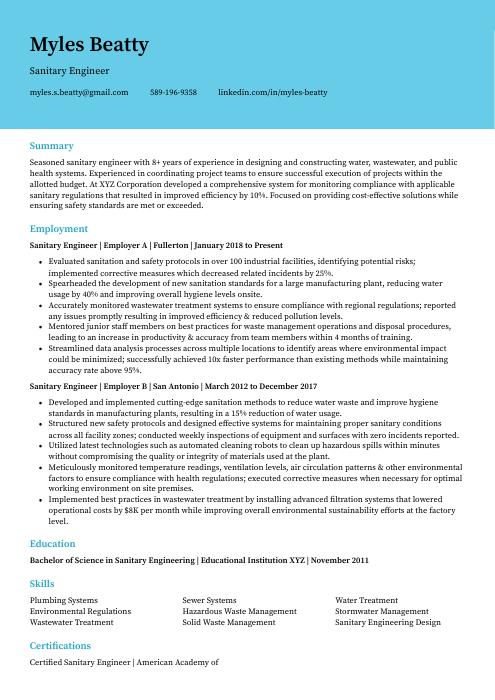 Dugong
Dugong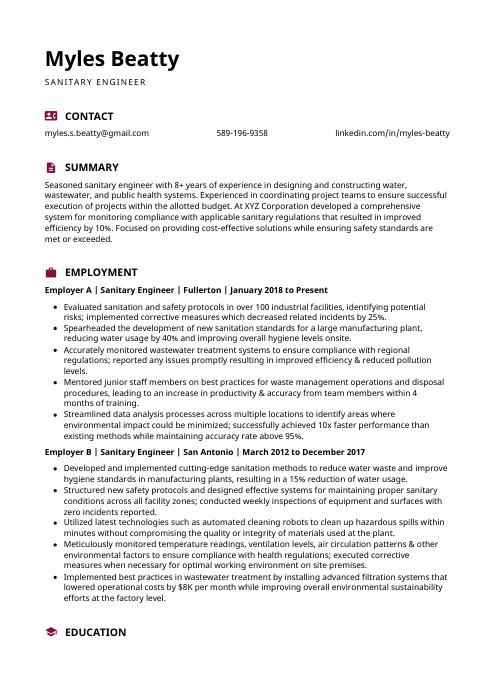 Hoopoe
Hoopoe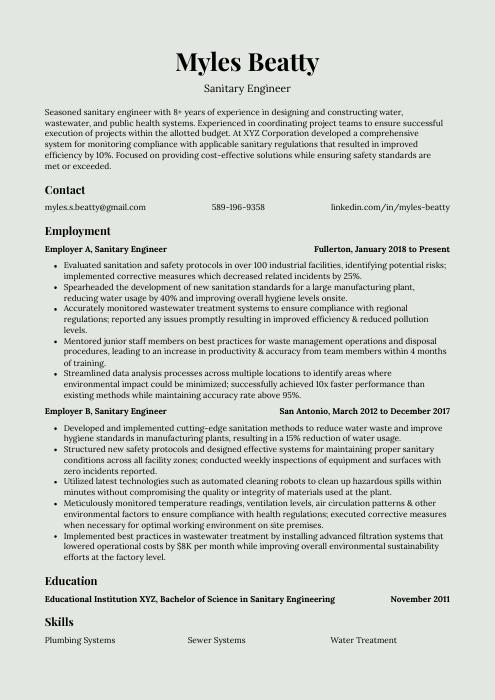 Saola
Saola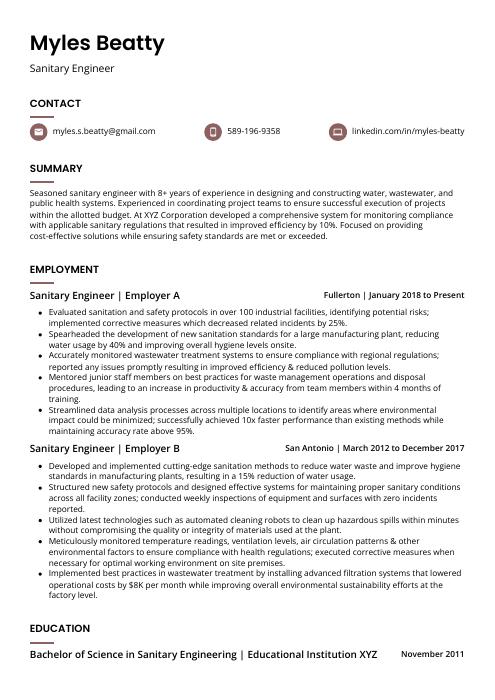 Fossa
Fossa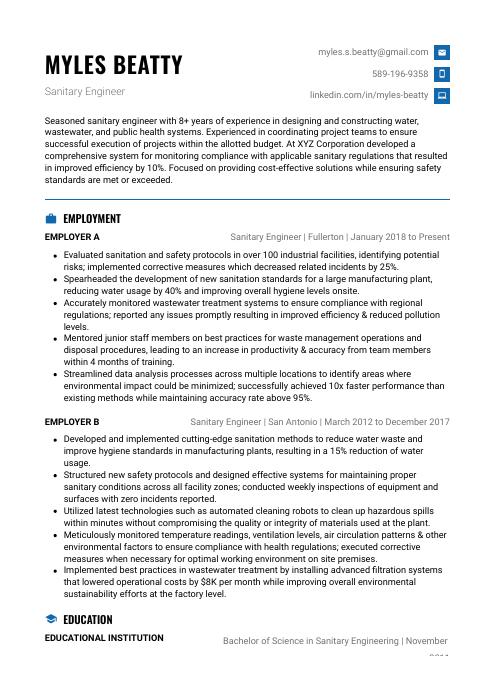 Echidna
Echidna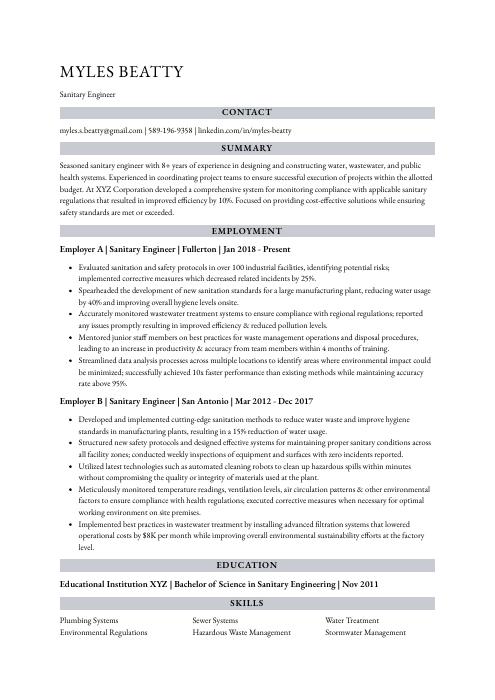 Numbat
Numbat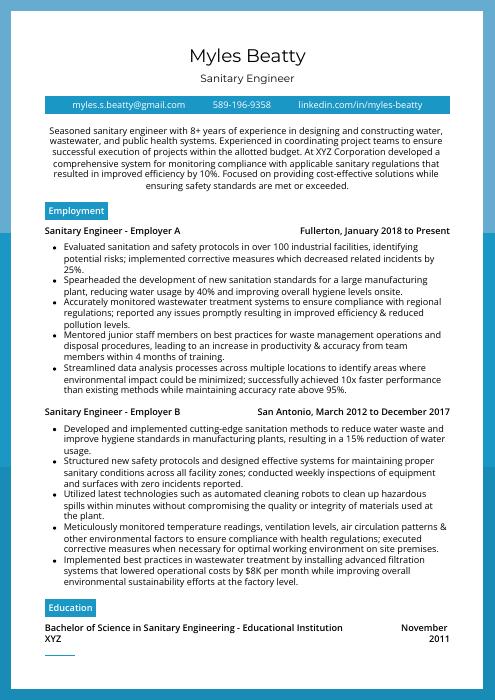 Rhea
Rhea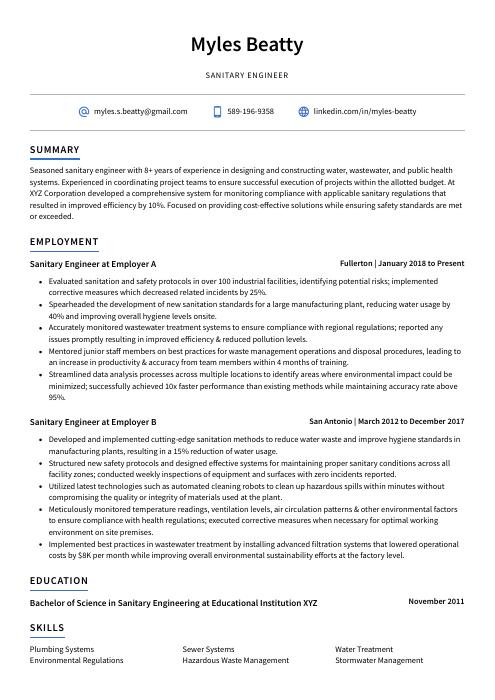 Axolotl
Axolotl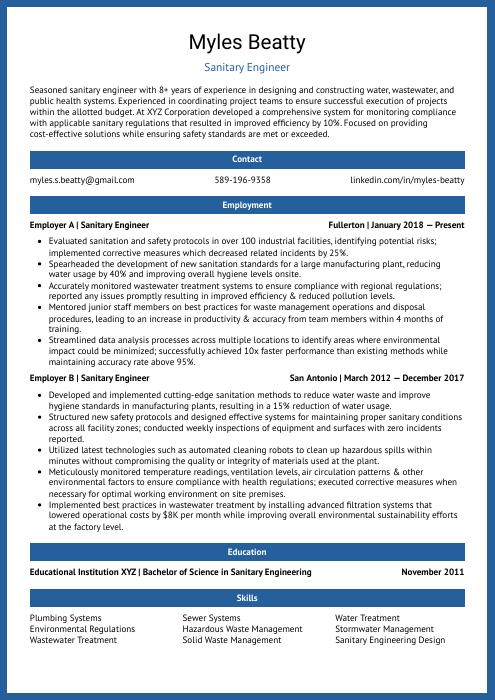 Ocelot
Ocelot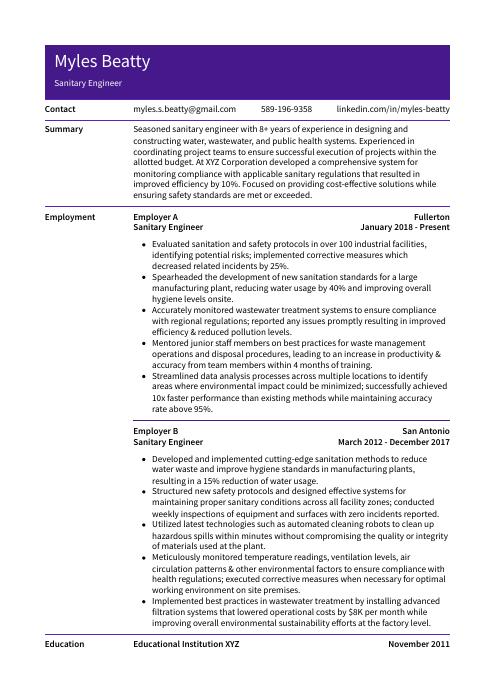 Pika
Pika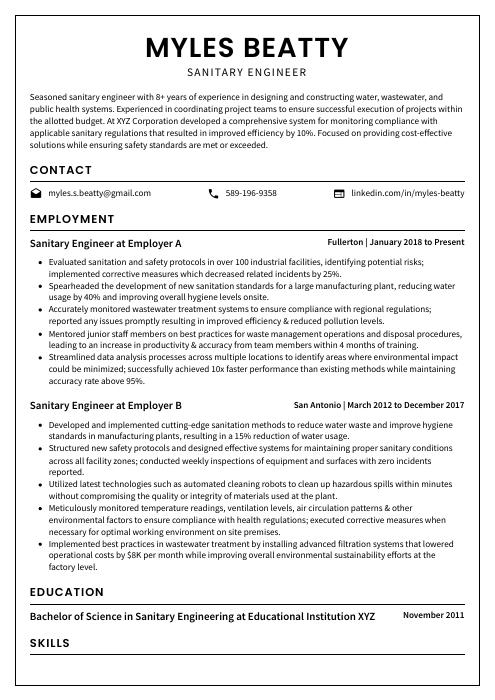 Cormorant
Cormorant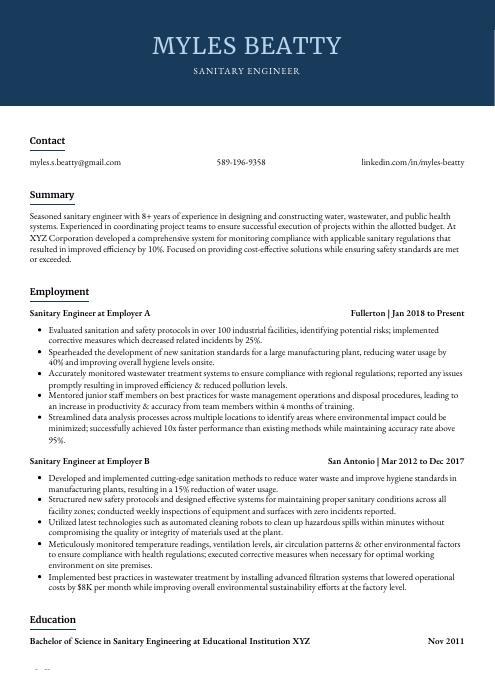 Bonobo
Bonobo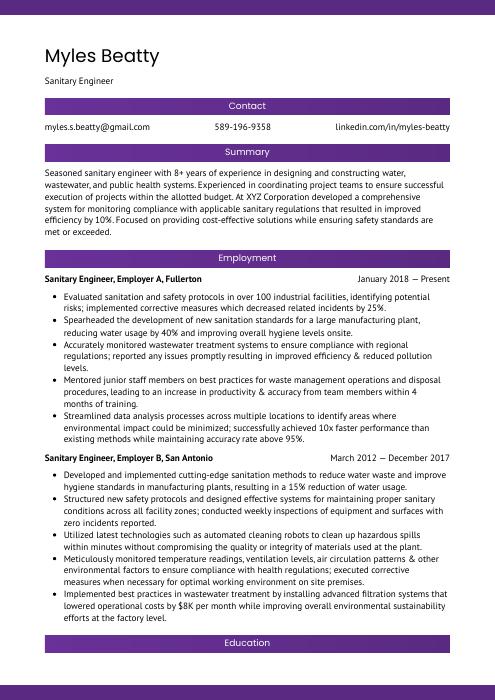 Jerboa
Jerboa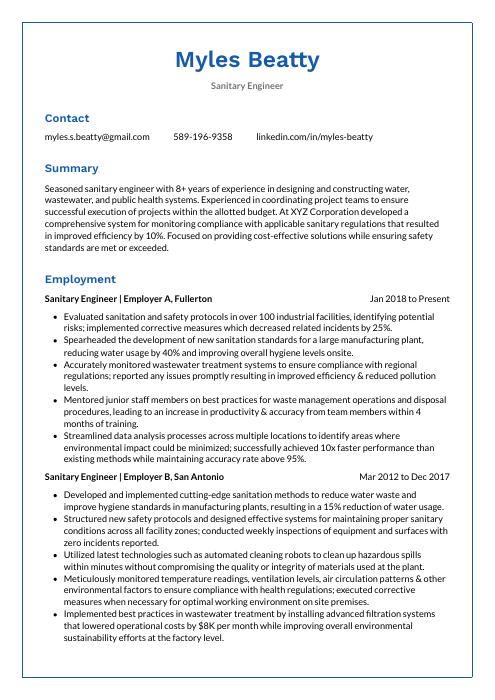 Markhor
Markhor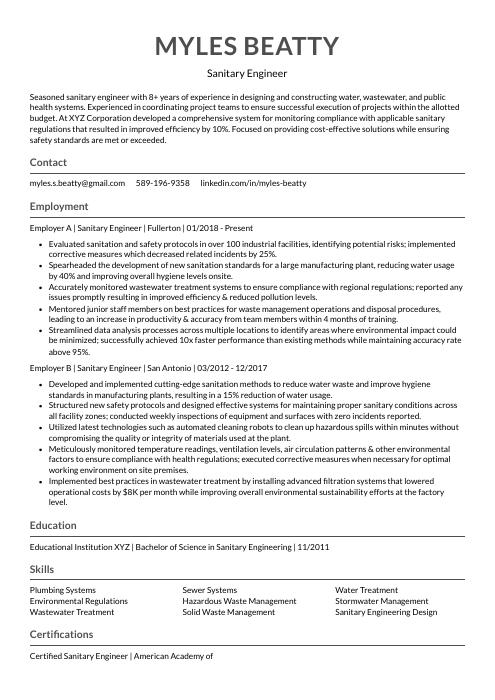 Indri
Indri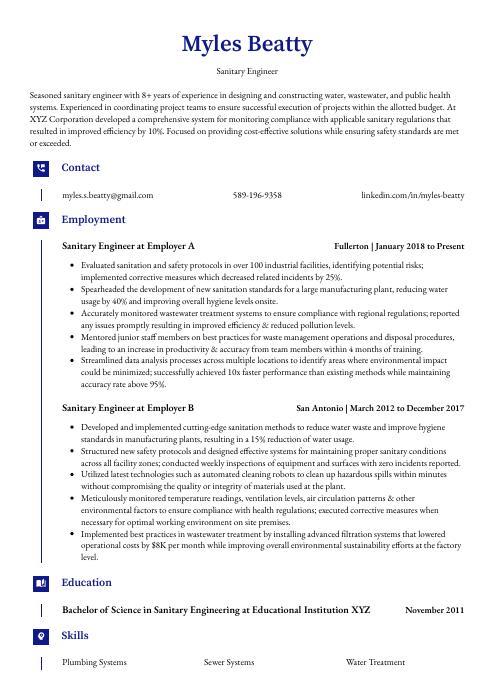 Gharial
Gharial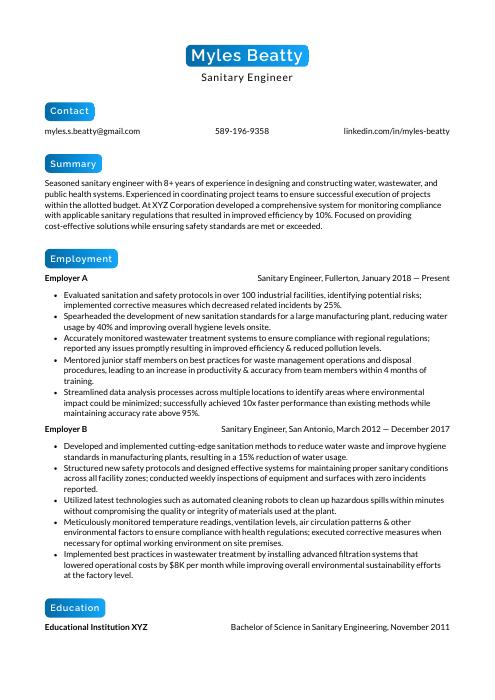 Kinkajou
Kinkajou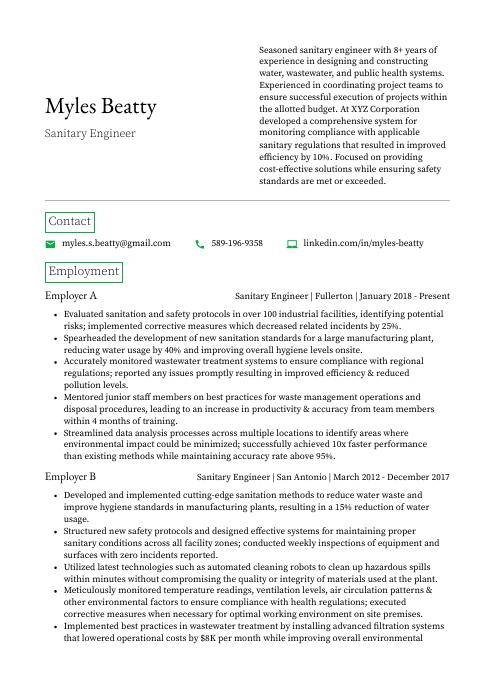 Quokka
Quokka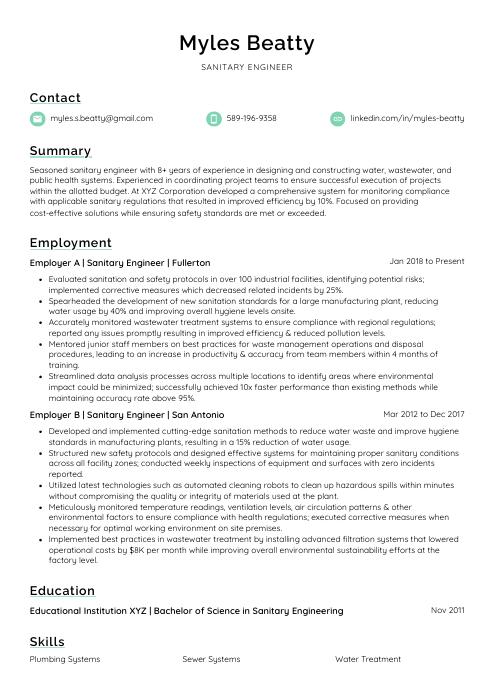 Lorikeet
Lorikeet Rezjumei
Rezjumei
